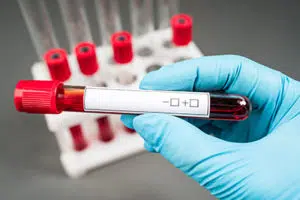This project aims to test the nitrogen hypothesis, which is that damaging, nitrogen-containing by-products of energy metabolism accumulate more readily in the cells of ME/CFS patients.
ME/CFS is diagnosed by its symptoms, which include post-exertional malaise, fatigue, and brain fog. It is unclear how these symptoms arise, and there are likely multiple routes to arrive at this chronic pathological state. However, there is a fundamental defect in energy metabolism in ME/CFS, which may be a common underlying cause of its symptoms.
We have hypothesized that reactive nitrogen by-products are accumulating in the cells of ME/CFS patients as a result of using amino acids for energy production in the mitochondria.To test this hypothesis, we will culture blood-based immune cells and feed them with labelled sugar, fats and amino acids. As the cells use the labelled sugar, fatand amino acids for energy production we will be able to monitor how their metabolism differs from healthy controls.

OMF is a non-profit 501(c)(3) organization
(EIN# 26-4712664). All donations are tax-deductible to the extent allowed by law.



Open Medicine Foundation®
29302 Laro Drive, Agoura Hills, CA 91301 USA
Phone: 650-242-8669
info@omf.ngo
Copyright © 2023 Open Medicine Foundation. All Rights Reserved.
What are the advantages of giving from your Donor Advised Fund (DAF)?
How do I make a donation through my DAF?
Just click on the DAF widget below. It is simple and convenient to find your fund among the over 900 funds in our system.
Still can’t find your fund?
Gifting of Stock
Broker: Schwab
DTC #: 0164
Account #: 47083887
Account Registered as:
Open Medicine Foundation
29302 Laro Drive
Agoura Hills, CA 91301
Please speak to your personal tax advisor and then email or call OMF at 650-242-8669 to notify us of your donation or with any questions.